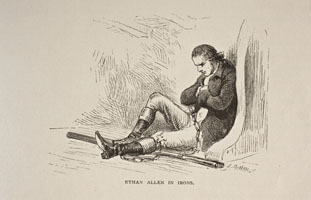Ethan Allen (1738-1789)

Ethan Allen is best known for the capture of Fort Ticonderoga as the leader of the "Green Mountain Boys" and for his tireless — and controversial — efforts to make Vermont independent from the British Empire, other colonies, and perhaps even from the United States. George Washington said of him that "There is an original something in him that commands admiration."
Born in Litchfield, Connecticut, on January 21, 1738, Allen had virtually no formal education but became familiar with Enlightenment ideas. He served briefly in the Seven Years War and operated an iron forge in Salisbury, Connecticut, before his warm embrace of deism caused his neighbors to have him warned out of the town in 1765. He and his wife, Mary Brownson, then settled in Northampton, Massachusetts, but he was warned out of there in 1767 and moved to the Green Mountains, then part of the farthest reaches of the colony of New York but also claimed by New Hampshire. He speculated in New Hampshire titles to property in the region and formed the Green Mountain Boys in 1771 to openly resist New York's authority over it. Consequently, the governor of New York offered a £20 reward for his capture and arrest, which was raised to £100 in 1774.
Between 1772 and 1775, Allen wrote a number of pamphlets and newspaper essays that advocated an extreme application of Enlightenment philosopher John Locke's ideas about property ownership. Allen argued that the value of any land was created solely by those who made it productive by working it. This view created a moral title to property that superseded any legal rights to it — and gave the possessors of the land the right to defend their moral title by force. Allen's vigorous defense of himself and the Green Mountain Boys against charges that they were an unprincipled, self-serving mob took on a much more serious aspect in 1775 when the Privy Council in London discussed sending regular troops to suppress them.
The Battles of Lexington and Concord interrupted any plans to take action against Allen. He seized the moment to join with Connecticut forces under Benedict Arnold who captured Fort Ticonderoga and its valuable artillery, on May 10, 1775. It proved a major early boost to colonial morale in the fight against Britain, and Allen was celebrated by the Continental Congress as the commander of the Green Mountain Regiment when it was formally incorporated into the Continental Army. The Green Mountain town leaders, however, voted to give formal command to his cousin, Seth Warner. Allen lost no time in joining Brigadier General Richard Montgomery's invasion of Canada. Operating an independent command ahead of the main body, Allen botched an attack on Montreal and was captured on September 25. He spent the next two and a half years as a British prisoner, enduring harsh conditions in British castles, New York City jails, and on prison ships known as hulks. He was exchanged in May 1778 and wrote A Narrative of Col. Ethan Allen's Captivity (1779), a work that lambasted the British government for his treatment. His writing became second only to Thomas Paine's Common Sense in influence on popular American thought about the conduct of the war.
Vermont declared independence from New York while Allen was a prisoner. For the next six years of his life, from 1778 to 1784, Allen devoted himself to promoting Vermont's interests and served as commander of the state's militia with the rank of Major General (George Washington also gave him a commission as Colonel in the Continental Army). He first tried to persuade the Continental Congress to recognize Vermont's independence, but New York's threats to withdraw from the union if Congress did effectively scuttled any such plan. Allen then turned to the British, pursuing a line of communication opened by prominent Virginian loyalist and British officer Beverly Robinson for Vermont to be accepted into the British Empire. From 1781 until 1784, Allen attempted to play Congress and the British government off one another. He ended conversations with the British not long after the end of the war (Vermont finally achieved statehood in 1791, after Allen's death).
Allen's life after the war was dominated by his publication of Reason the Only Oracle of Man (1784), considered the first work published in the United States that openly attacked Christianity. Allen stated in the preface that "I am no Christian" but also denied being a deist, "for I have never read their writings." It shocked those who read it and seriously (although only temporarily) undermined Allen's reputation as an iconic American patriot. Most copies of the work were burned in a mysterious fire. He died in Vermont in February 12, 1789.




